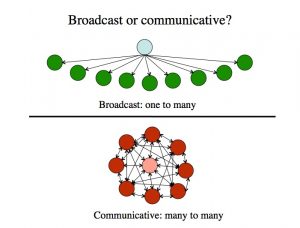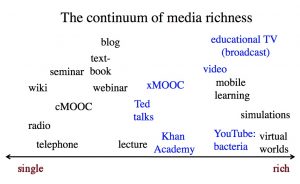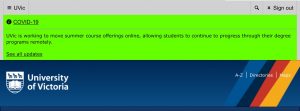MOST MEMORABLE ONLINE LEARNING EXPERIENCE
Last year I took a French online course in another college in Vancouver (Selkirk college). The course helped me get another credit at home. I only needed to stay at my home to complete this course. I think asynchronous online courses helped people arrange their own study time to maximize their flexibility and students learn the course materials and complete the assignments at different times. I think I really like this online course. Firstly, Uvic restricted students to take six courses at most, I really want to graduate earlier, so I chose to take this online course. The online course is really convenient and efficient because I don’t need to go to school and meet professors face-to-face, helping me save a lot of time. The videos teacher posted online highlighted all the main points we should master and what we should consolidate after class. And there would be corresponding small quizzes after each video. These quizzes helped us find out what knowledge we had mastered and what knowledge we needed to review in the fastest time. I think taking this online course is a great experience for me and I am willing to take more online courses in the future.

Photo from Screenshot of the Moodle @ Selkirk
Photo from youtube from Wall Street Journal
CONCEPTS AND THEORIES FROM CHAPTER 5 AND 7 READINGS
Chapter 5 introduced many concrete practices of online learning and chapter 7 introduced media and technologies in educational contexts. Firstly, this online course contained many videos in each chapter. Video Content and learning contained both visual and audio contents which were pretty vivid for learners to learn knowledge. The videos also allowed me to pause and watch it over and over again, so I could listen to it at any time, mark the complete notes and watch the key points repeatedly. I think the grading system for this course was really fair. This course contained several quizzes and one final exam. The quizzes were all about how much knowledge did you know. The proportion of each small test was relatively small, so this grading system had a relatively high fault tolerance rate. Moreover, I think the French class combined both broadcast and communicative media. I think this class material was mainly about the broadcast. Each student faced exactly the same video and quizzes, which ensured a common standard of learning. The email of the instructor and online discussion forum was communicative media, which helped students communicate with other classmates and instructors without presenting in the same place. The discussion forum was an effective way for students and instructors to communicate their opinions and ask questions on the internet. They could receive feedbacks from different people, which helped their learning process a lot.

Photo from 7.5 Broadcast vs communicative media
Moreover, the media richness of the online courses helped the course present the materials vividly and students would have more interest in the various richness of the medium. “A well-produced radio program is more likely to be educationally effective than a badly produced video, but in terms of representation of knowledge, the possibility of radio in terms of media richness will always be less than the possibility of video.” (chapter 7) I clearly remembered there was a speaking part of this course that required students to watch the video and follow the dialogue in the video screen. The videos helped all of us see interesting animations and dialogues. When I could not hear the pronunciation clearly, I would pause playback at any time and practice more.

Photo from The continuum of media richness
THE IMPORTANCE OF ONLINE CLASS

Photo from Uvic official website
The University of Victoria is taking action to respond to the COVID-19 pandemic in our community. In order to protect the health and safety of students, the school has transformed all face-to-face courses into online courses. I think online classes are very important in this difficult period. It not only protects the health of students and professors but also enables students to continue the study and complete their studies at home. One of my professors posted her explaining video online. She also changed the final exam to the format of the online assignment. I think online courses are really convenient. We can watch videos and do some assignments to practice the course material efficiently.
In conclusion, online courses provide so many positive effects for students like us. It provides various ways for students to learn the knowledge. I really want to take more online courses in the future.
REFERENCE
Crosslin, M. (2018). Effective Practices in Distributed and Open Learning. https://via.hypothes.is/https://uta.pressbooks.pub/onlinelearning/chapter/chapter-5-effective-practices/
Bates, T. (2019). Understanding technology in education. https://via.hypothes.is/https://pressbooks.bccampus.ca/teachinginadigitalagev2/part/chapter-8-understanding-technology/
https://moodle.selkirk.ca
https://www.uvic.ca/home/tools/index.php